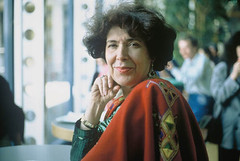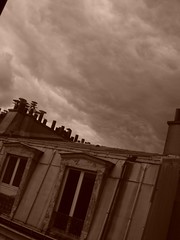Assia Djebar, Algerian White. Translated from the French by David Kelley and Marjolijn de Jager. Seven Stories Press, 2000.
Several years ago, a few colleagues and I invited the Algerian author Assia Djebar, who was in Toronto for the International Writers’ Festival, to dinner. We were in the process of putting together a literary anthology about archives and hoped that she would contribute something. I picked her up in a cab, and we met the others at an Argentinean restaurant known for its slightly bohemian atmosphere and good food. By then, the targeting and killing of authors, artists and intellectuals in her country had ended, but as we sat down for dinner, it was still on our minds. She chose a seat against the wall, explaining almost apologetically, that she felt safer this way.
From 1993 to 1997, some sixty journalists were killed in Algeria, many assassinated in the most horrifying ways imaginable. Also targeted were the country’s poets, playwrights, educators, police officers and Catholic clergy and monks, not to mention 100,000 ordinary Algerians.
In Algerian White, Djebar chronicles what she calls the death of Algerian writing. The book is dedicated to, and in part addresses, her three dear friends – a psychiatrist, a playwright, and a sociologist – all brutally murdered in 1993.
In many ways, Algerian White is an imperfect text. And even though (or perhaps because) you can feel that it was written quickly and through confusion and anguish, it’s one of the best examples of writing about mourning that I know. Djebar writes of her attempt to refuse healing, dreading the forgetting that comes with it: “No; I say no to all ceremonies: those of farewell, those of pity, those of chagrin which seek their own comforts, those of consolation” (53). But healing comes regardless. The writer, out of self-preservation, or simply carried forward by the wave of time, finds herself moving on:
“I simply live again elsewhere; I surround myself with elsewhere and my pulse continues to beat. And I regain the desire to dance. I laugh already. I cry as well, straight afterwards, troubled to note that laughter is returning. What, I’m getting over it! In my own way, I forget.” (138)
Djebar has a large body of work of novels, essays, films and poetry. She writes about women and Islam, about war, colonization, migration, North African history, and about our relationships to language, song, stories, land and the idea of home.
If you don’t know her work, take a look. She’s worth your time.
[Photo: cultphoto]



